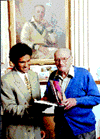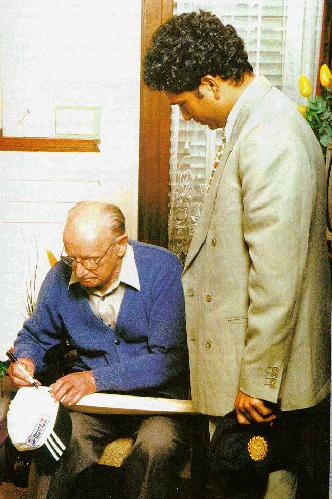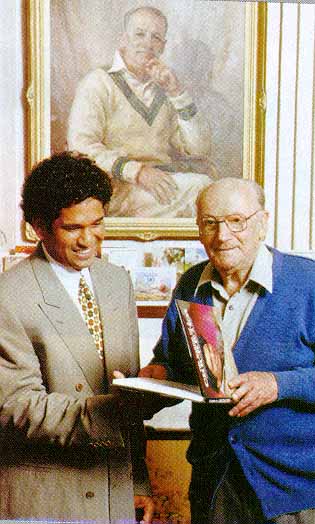In the Don's Liar
What do two cricketing greats
talk about when they meet? Here’s the inside story...

It was the ‘greatest day’ of
Sachin Tendulkar’s life. The day he met Sir Donald
Bradman, for one full hour. In the ritual of hierarchy that
sports builds over decades it was, in all probability, three
players who would make the all-time final eleven in a cricketing
line-up, chatting about the game. The press was excited, even the
Indians in Adelaide got wind of the flight Tendulkar was coming
on.
There were hordes of them at the airport. One
approached Sachin to take him to the Ganesh temple at Adelaide
because it was Ganesh Chaturthi. Another, who owned a restaurant,
wanted Sachin to come and have Indian food. But it was a tired
Tendulkar. And Greg Chappell had come to pick him up. And
Tendulkar had to sleep.
Next morning, the day of the great encounter,
Tendulkar had to be outfitted with a black dinner jacket for the
banquet at night. The Chappell brothers took Tendulkar to Trims.
Interestingly, the Chappells outfitted themselves too in black
jackets, the first time since they left high school. Around three
in the afternoon, Tendulkar, avoiding the media in the lobby,
went straight to the basement from his hotel suite. With him in
the car were his agent Mark Mascarenhas and Shane Warne. Remarks
Mascarenhas: "Both Sachin and Warne were nervous like
hell."
 There were around 20
journalists waiting outside Sir Donald’s house in
Kensington, a 15-minute drive from the hotel. A modest,
middle-class home, the three walked in to be introduced to the
great man himself.
There were around 20
journalists waiting outside Sir Donald’s house in
Kensington, a 15-minute drive from the hotel. A modest,
middle-class home, the three walked in to be introduced to the
great man himself.
While Warne and Tendulkar were dressed in
almost identical suits, the Don was in casual attire. The first
thing Bradman did was to enquire about Warne’s shoulder. To
Tendulkar, he said: "I’m so glad you came." Says
Warne: "He was very friendly, relaxed, mentally as sharp as
ever and even threw in a few good one-liners, although I
can’t really remember them now, probably because I was
trying too hard to take it all in."
He asked Tendulkar whether he moved before the
ball left the bowler’s hand. To which the younger batsman
rather modestly replied, "I don’t know." With a
glint in his eyes, Sir Donald tapped Tendulkar’s shoulder:
"I think you do. You begin your movement before the bowler
balls, otherwise you wouldn’t have the time to play the kind
of shots you do."
Before Sachin could recover from the compliment
the Don went on to the next. He commented that it didn’t
look like Sachin had been coached. Sachin said: "No,
I’ve had three coaches. One in school, one at the state
level and one at Test level." "I didn’t think you
were coached," explained Sir Donald, "because anybody
who’s been through coaches is told to play with the left
elbow pointed towards mid-off. You don’t do that. I
didn’t do that. That gives you the flexibility to play in
any direction anywhere." And he went on to demonstrate a few
strokes.
With the discussion turning to cricket in
general, Sir Donald remarked that he watched cricket on
television as often as he could and that he still enjoyed
watching it. Said he: "The game’s grown by leaps and
bounds. But one-day cricket is where the game is today. The
public comes to see runs scored and wickets fall. They want 400
runs in a day and 15-20 wickets to fall. That’s
entertainment."
Discussing the good batsmen of today, Sir
Donald said he thought Sachin the best batsman around at the
moment and the closest in style to the way he played. Says Warne:
"Understandably, Sachin was very honoured by that." But
he also commented about the high quality of cricket played by the
Waugh brothers and Brian Lara though he thought Tendulkar’s
technique was perfect. Lara, he thought, took more risks. Warne
agreed to that, saying: "Yes, he takes more risks. I think I
can get him out anytime I want. He has so many openings. But with
Tendulkar the problem is that there are no openings. He can spot
the length of a delivery better than any other human being."
It was Warne’s turn to ask the Don a few
questions. Who’s the best bowler the Don ever faced?
"His reply," says Warne, "was the same as it has
always been. Bill O’Reilly. He thought I bowled slower than
O’Reilly and spun the ball more. He said
O’Reilly’s strengths were his pace and bounce. He
always started with two short legs and got a lot of close catches
with his extra bounce. Sir Donald described O’Reilly as a
middle-finger leg-spinner while he said I was a third finger
bowler." At which point Mascarenhas asked Sir Donald whether
O’Reilly had any shoulder problems. "He pointed a
finger to his head and said ‘No, only one
problem’," says Mascarenhas.
There were two queries Tendulkar had for the
world’s greatest batsman. What his movements were just
before the bowler delivered the ball and how he prepared for a
game. To the first, Sir Donald said he moved back and across to
the off-side before delivery because he felt he could move
quickly in any direction from there. "His answer to the
second was amazing and showed the changes that have come over the
game since he was playing," says Warne. Adds Tendulkar:
"He said he went to office every day of a Test at seven to
work (he was a stockbroker) and by 10 he was at the ground. After
the day’s play he went home for dinner and returned again at
seven to his office to work till 10. He never had time to think
of anything. He had to work to make ends meet. That he played as
an amateur."
 On hearing how much money
Tendulkar was making, Sir Donald addressed Mascarenhas and said:
"I hear you made him a lot of money. He has done very well.
When I was a player I’d get one pound when I turned up for
my state and 25 pounds when I played for my country. Now, players
get money for playing cricket."
On hearing how much money
Tendulkar was making, Sir Donald addressed Mascarenhas and said:
"I hear you made him a lot of money. He has done very well.
When I was a player I’d get one pound when I turned up for
my state and 25 pounds when I played for my country. Now, players
get money for playing cricket."
Sir Donald also had a comment on the weight of
Tendulkar’s bat. Said he: "That’s very heavy. With
a heavy bat it will make it hard to cut and pull." Of
course, needless here to comment on the monstrosity of those very
Tendulkar shots.
While Tendulkar admitted to being nervous
before matches but getting even-keeled once he hit the stadium,
Sir Donald said he still enjoyed watching cricket on television.
He watched Tendulkar’s recent Sharjah knocks on television.
And he told him: "Next year when you come here get some
runs."
As they turned to take their leave of the
awesome cricketer, Sir Donald said: "I better come out with
you or the photographers will be waiting the whole day." He
even turned to Tendulkar and said: "I hope they don’t
give you a hard time. You will be hounded by autograph
hunters."
Incidentally, the only sporting memorabilia
around Sir Donald’s house was a photograph of him and his
wife with Pele.
For Tendulkar, however, the day wasn’t
over. At the dinner in honour of Sir Donald’s 90th birthday
cricket commentator David Hookes interviewed him on stage. Hookes
started off by saying "Sachin you are only 26 and have
achieved so much..." Tendulkar corrected him, to the
amusement of the audience and said: "No, David, I am only
25." Modest once more, he remarked the adulation and
admiration he got from his countrymen was more a motivation than
a hindrance. And though it was difficult to go out in Bombay he
had to cope with it. On being thanked for having made it to
Adelaide, the Indian genius remarked, amidst a thundering
ovation, that it was his privilege and honour.
Of course, the ultimate compliment arrived in
the papers a day later when John Bradsen, Sir Donald’s son,
revealed what his father said to him after Tendulkar took his
leave. "What a bonzer little fellow!" he said.
"He’s a lovely chap." Bonzer, incidentally, is an
Australian term for an excellent and pleasant person.

 There were around 20
journalists waiting outside Sir Donald’s house in
Kensington, a 15-minute drive from the hotel. A modest,
middle-class home, the three walked in to be introduced to the
great man himself.
There were around 20
journalists waiting outside Sir Donald’s house in
Kensington, a 15-minute drive from the hotel. A modest,
middle-class home, the three walked in to be introduced to the
great man himself. On hearing how much money
Tendulkar was making, Sir Donald addressed Mascarenhas and said:
"I hear you made him a lot of money. He has done very well.
When I was a player I’d get one pound when I turned up for
my state and 25 pounds when I played for my country. Now, players
get money for playing cricket."
On hearing how much money
Tendulkar was making, Sir Donald addressed Mascarenhas and said:
"I hear you made him a lot of money. He has done very well.
When I was a player I’d get one pound when I turned up for
my state and 25 pounds when I played for my country. Now, players
get money for playing cricket."